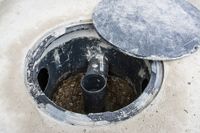
Septic tanks are designed to safely and effectively treat household wastewater. Over time, solid matter accumulation prevents more waste from entering the tank, which can lead to overall system failure. Regular septic pumping clears solid waste from the bottom of your tank and keeps your system running smoothly. If you haven’t had septic maintenance this year or are experiencing slow drainage or frequent clogs, contact a professional, and read this quick and easy guide, so you know what to expect.
Brief Guide to Septic Pumping
How Septic Pumping Works
Septic contractors will locate the access lids for your tank to check liquid the levels. Pumping when there is too much liquid in the tank can damage your system. If the levels are safe, professionals will lower a vacuum hose into the tank, and a high-powered suction will remove solid waste matter buildup. If the liquid is too high, you have to limit the water usage until safe levels are achieved.
What Happens After Pumping
 Once your tank is pumped, the professionals will clean out the remaining sludge with a septage spoon, which dislodges stuck-on waste matter. They may also perform backflushing; a process that loosens and removes any remaining particles. Technicians will then check inside the empty tank for any signs of structural damage like leaks or cracks. If problems are found, they may offer different solutions, depending on the age and condition of your tank.
Once your tank is pumped, the professionals will clean out the remaining sludge with a septage spoon, which dislodges stuck-on waste matter. They may also perform backflushing; a process that loosens and removes any remaining particles. Technicians will then check inside the empty tank for any signs of structural damage like leaks or cracks. If problems are found, they may offer different solutions, depending on the age and condition of your tank.
Septic Pumping Maintenance Schedule
It’s recommended to have septic pumping every three to five years. However, if you live in a larger household or use a garbage disposal, you should schedule this service more frequently. Take care of your septic system by only flushing toilet paper and organic waste matter; you should also get regular inspections. Speak with your septic professional about arranging routine maintenance appointments, so you always remain on schedule.
Make sure your wastewater treatment system is running properly with septic pumping from AA & A Drain Cleaning in Dalton, GA. Their specialists handle septic problems on residential, commercial, and industrial properties. They quickly identify septic problems utilizing the latest technology like CCTV cameras and offer comprehensive solutions to ensure smooth system operation. Get details about their range of routine septic services online or call (706) 226-1267 to schedule system maintenance today.
About the Business
Have a question? Ask the experts!
Send your question

